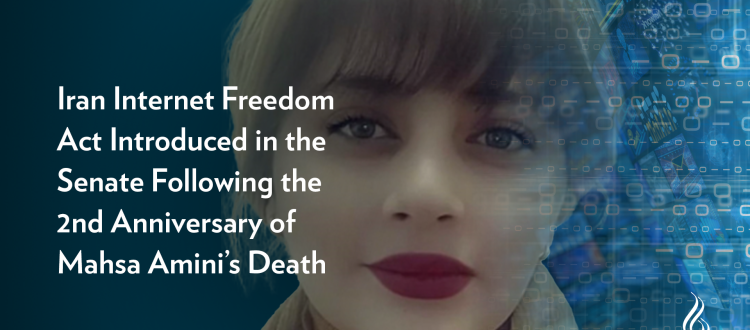Iran Internet Freedom Act Introduced in the Senate Following the 2nd Anniversary of Mahsa Amini’s Death
Washington, DC — Today, two years after the tragic death of Mahsa Amini in Iranian state custody, Senators Ben Cardin (D-MD) and James Lankford (R-OK) introduced the Iran Internet Freedom Act (S.5076) in the Senate. This legislation aims to support internet freedom in Iran — an issue central to combatting the regime’s crackdown on the Woman, Life, Freedom protests sparked by Mahsa’s death. A similar measure, the IRAN Act (H.R.9299), already has 24 cosponsors in the House following its introduction by Representatives Eric Swalwell (D-CA14) and Claudia Tenney (R-NY24) last month.
The Iran Internet Freedom Act seeks to address the Islamic Republic’s continued weaponization of the internet by expanding access to VPNs, finding ways to circumvent internet blackouts, and ensuring that sanctions enforcement does not prevent companies from providing Iranians with the necessary tools to access the internet. The Senate version also authorizes over $30 million in Open Technology Fund grants to support reliable and secure internet service in Iran. If the bill is signed into law, the Secretary of State in conjunction with the Treasury and other federal agencies will have 120 days to develop and submit a comprehensive strategy to promote internet freedom in Iran.

The bill’s introduction in the Senate intentionally coincides with the two-year anniversary of the Woman, Life, Freedom movement. After Mahsa Amini was killed by Iran’s morality police in September 2022 for allegedly wearing her hijab improperly, massive demonstrations took place across the country and the world as Iranians came together to stand up against gender apartheid and the regime’s oppressive policies. The Islamic Republic’s brutal response — including killing and injuring protestors — was compounded by widespread internet shutdowns intended to block Iranians from organizing and sharing their stories with the world. These crackdowns have become a hallmark of the regime’s repressive tactics, using digital surveillance to stifle dissent and silence activists.
The introduction of the Iran Internet Freedom Act not only serves as a direct response to the regime’s digital authoritarianism but also stands as a tribute to Mahsa Amini and the countless Iranians who continue to demand justice. As Iran remains one of the world’s lowest-ranked countries for internet freedom, safeguarding digital access for the Iranian people is essential to their fight for fundamental human rights. The internet is a critical tool for information exchange, organizing, and connection to the outside world, making this legislation all the more urgent in the ongoing struggle for freedom in Iran.

